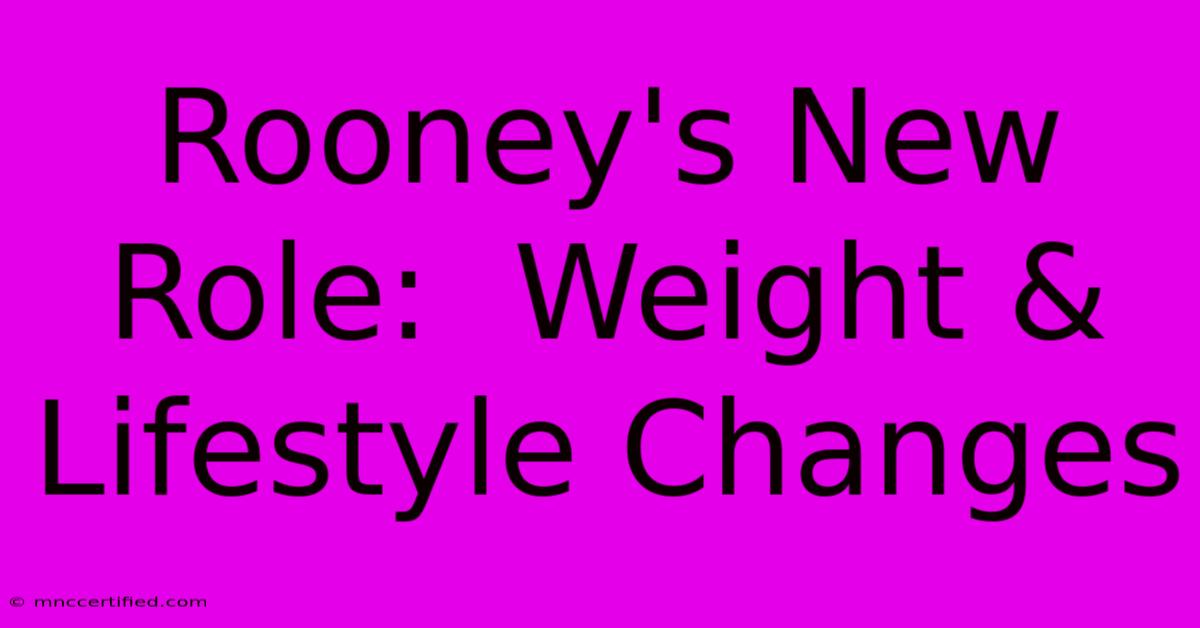Rooney's New Role: Weight & Lifestyle Changes

Table of Contents
Rooney's New Role: Weight & Lifestyle Changes
Wayne Rooney's career transition from legendary footballer to manager has been widely documented, but a less discussed aspect is his significant weight and lifestyle transformation. This article delves into the changes Rooney has undertaken, exploring the impact on his health, his managerial style, and his public image.
From Pitch to Podium: A Physical Metamorphosis
Rooney's playing days were characterized by intense physical demands. Maintaining peak fitness was crucial, requiring a strict diet and rigorous training regime. However, retirement brought a shift in priorities, and like many athletes, Rooney experienced a change in his physique. Images circulating online show a noticeable weight gain in the period following his retirement from professional football.
This weight increase wasn't solely due to inactivity. The pressures of management, the demands of a demanding job, and the less structured lifestyle often associated with retirement all contributed. The transition from a highly disciplined athletic lifestyle to a less regimented one is a common challenge faced by many former athletes.
The Impact on Health & Well-being
While the exact details of Rooney's health haven't been publicly released, it's reasonable to assume that a significant weight gain could have implications for his long-term health. Issues like cardiovascular health, blood sugar levels, and joint problems are potential concerns associated with significant weight changes. Managing these risks is crucial for maintaining well-being.
The Weight Loss Journey and Lifestyle Adjustments
Recently, Rooney has actively addressed his weight, embarking on a noticeable weight loss journey. This transformation speaks volumes about his commitment to personal well-being and showcases his dedication to a healthier lifestyle.
Diet and Exercise: Key Pillars of Transformation
While specifics are unavailable, it’s likely Rooney has adopted a balanced diet and a regular exercise program. These are fundamental components of any successful weight loss strategy. This may include a focus on nutrient-rich foods, portion control, and increased physical activity, perhaps incorporating activities he enjoys to ensure long-term adherence.
Mental Health & Resilience
Beyond physical changes, Rooney's transformation likely involves a mental health aspect. The transition from the highly structured world of professional football requires significant mental adaptation. Maintaining a healthy lifestyle can significantly improve mental well-being, contributing to better stress management and overall resilience.
The Managerial Perspective: Impact on Coaching Style
Rooney's weight loss journey could indirectly influence his managerial style. A healthier lifestyle often translates to increased energy levels, improved focus, and enhanced decision-making capabilities – all essential qualities for a successful football manager. His renewed commitment to fitness could also inspire his players and foster a healthier team environment.
Public Image and Role Model Status
As a public figure, Rooney's transformation is also subject to public scrutiny. His weight loss journey serves as a powerful example of the importance of prioritizing personal well-being, particularly for retired athletes who may face unique challenges during their transition. It could also inspire others going through similar experiences.
Conclusion: A Holistic Transformation
Wayne Rooney's weight and lifestyle changes illustrate the multifaceted nature of personal transformation. It’s a journey encompassing physical health, mental well-being, and professional success. His journey serves as an inspiring example for anyone aiming to prioritize health and wellness, demonstrating that a sustained effort and commitment to change can achieve significant, positive results. The ongoing impact of these changes on his managerial career and his public image will continue to be observed with interest.
Keywords: Wayne Rooney, weight loss, lifestyle change, health, fitness, football manager, diet, exercise, mental health, public image, role model, athlete transition, weight management.

Thank you for visiting our website wich cover about Rooney's New Role: Weight & Lifestyle Changes. We hope the information provided has been useful to you. Feel free to contact us if you have any questions or need further assistance. See you next time and dont miss to bookmark.
Featured Posts
-
John Prescott Unisons Tribute
Nov 22, 2024
-
Real Estate Investing In Florida
Nov 22, 2024
-
Top Qb Recruit Joins Colorado
Nov 22, 2024
-
Iceland Volcano 2024 Travel Safety
Nov 22, 2024
-
Jussie Smollett Charges Dropped
Nov 22, 2024